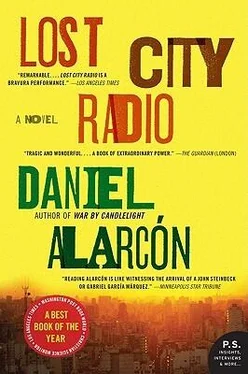The school. There were no watchmen, only a wrought-iron fence held together with an ancient padlock. Easy to climb over. Later, “What did you do,” his father asked him, “and why?” Rey’s arms were bruised where the crowd had gotten hold of him, the tight clasping of hands and fists.
“I didn’t do anything.”
“Anything?”
Rey choked on a cough. Outside, the crowd clamored for justice. “I didn’t do that ,” he clarified.
“Explain,” his father commanded.
So he did: the boredom that had led to setting small fires in the field behind the clinic, the flames that had cast orange shadows over the gravelly earth, the smooth stones that had glowed in the firelight, and then, the target shining and obvious, calling them from the other side of town. The evening was clear and cool. It felt good to run with a pocketful of rocks. They stopped at Mrs. Soria’s bodega— taptap tap tap tap —with coins they’d pooled together, and the liquor burned but they choked it down, closing their eyes as they swallowed, everything emerging jagged and blurry. “Why?” his father asked again, but Rey couldn’t come to any conclusions about his own motives. He looked his father in the eye, a thirteen-year-old, still not sober three hours after his last swig, and felt something approximating pity, his father’s black eyes like pools of oil, his father’s graying hair, his face creased with disappointment, not a bad man, at least not at home. At school, he was a tyrant, of course, but in this sense, he was normal, no better or worse than any other headmaster. And Rey didn’t hate school, at least not with the passion that his friends did.
“I don’t know,” Rey said. Is it possible to confess without acknowledging blame?
The fact was, he shouldn’t have been caught at all. Rocks thrown at the school building on any other night? Harmless. A few windows shattered. What might have happened? Would anyone have thought to blame the son of the headmaster? There were dozens of poor kids from poor families, children with ashy knees and grim faces, who would have been blamed first. No one saw Rey. An elderly neighbor claimed to have spied four boys, but they were just shadows, laughing and carrying on. They could have been anybody. Then there was a flash of light and the boom: this changed everything. The explosion brought the army into town the next day. They came with guns, determined to find a culprit.
These things would come later, and still, that night, there was no reason to get caught. Rey and his friends raced to the plaza to see it. Curiosity, nothing more. His friends had disappeared into the crowd, hadn’t they? Hadn’t they drunk as well, weren’t they in awe of the fire and as full of adrenaline? Why did you throw rocks at the school (in the end a meaningless crime, something that might have gone unnoticed on any other night), his father asked, but just as logically he could have said: Son, how did you turn the town against you? Why did you bring this all on yourself? On us?
Something important had happened. Rey knew it at once. The mayor’s office was a small building, and when he arrived in the plaza, it seemed ready to collapse. Flame clung to the wooden roof beams. Glass had melted into yellow and red shapes, transfigured. Burning papers, burning chairs. Someone ran to tell the mayor. A plume of smoke curled into the sky, and there was heat. Everything had the air of urgency, of that long-wished-for, long-awaited trouble. And Rey was still drunk. He felt it in his breathing, in the strange glare of the fire. He felt shy and self-conscious. The fire crackled, and then the roof beam fell in a shower of embers. Smoke. The crowd gasped. Rey pulled his handkerchief up once again, resolved to find Trini, to share the excitement of this moment. His friends were gone, dispersed and disappeared, and Rey felt invisible at the peripheries of the crowd, but he was not. It took only a few moments for him to be spotted: ambling about unsteadily in the shadows of the plaza, wild-eyed, a dark bandanna covering his mouth and nose. As if terrorists dress this way! As if there were a uniform! But there he was, at the edge of the scene, looking very much the part.
Similar pictures had run that week on the front page of the newspaper — photographs of the arrested man in his youth — at a protest over school fees, and this was all it took.
“I’m innocent,” he told his father later in the cell.
“You’re stupid,” his father said. “They think you tried to kill the mayor.”
And in response, the town had nearly killed Rey, right there in the plaza. The tailor, who had made Rey his first suit, grabbed him by the arm and called out, “Here he is!” There was a struggle; the angry crowd surrounded him, his face still covered, and they yelled:
Arsonist!
Criminal!
Terrorist!
They didn’t yet know who he was. The fire burned hot, and they puffed their chests out, a pack hungry for retribution. It was an instant, only an instant before his bandanna was removed, and then the crowd gasped again: the headmaster’s son! A terrorist! They recognized his face, and he recognized theirs: the butcher with his heavy mustache; the mayor’s secretary with her perpetually worried look; the stooped, old grounds-keeper, his leathery skin taut and gleaming. His town, the people who had raised him, aghast, betrayed. They surged at him, to eat him, Rey supposed; it was that kind of anger. He was an animal ready for slaughter. Just in time, Trini stepped out of the crowd, took his nephew away by the arm, led him ahead of the crowd, to the jail, the town parading behind the headmaster’s captured son, certain they had found their terrorist.
YEARS LATER: the party where he met Norma, the evening he toyed with her. You don’t know who I am, do you? They’d danced until the question had its own weight, until Rey himself was wondering who he was and why he had said it. Was he the boy who had stumbled into a crime, the boy who eventually fled the town for the city with his father and uncle? There was a drum and then a cymbal, a syncopated beat being broken and repaired. Who am I? What am I? Involved, he thought, I am involved. In what? Ah, he was asking himself too many questions. Dance, don’t think. In things I can’t talk about, not even to myself. Certainly not to her. A sympathizer? It sounded inessential and soft. Unimpressive. He watched her, her face in shadow, now in light. I am the vanguard, he told himself, and had to frown at the pomposity of the phrasing. Enough: the band played, and his feet moved, and he kept his eyes on her hips as they swayed. Can she see me? His hand was steady at her back. Music! Then they were on the bus, and then there was a roadblock, and in a moment of panic, he had given away all of his secrets, stuffed them in her pocket. She suspected nothing. He expected the worst.
He rode in the green truck that morning, forcing himself to think of his uncle Trini, of other, more hospitable jails. Trini would get him out of all this, would place a call to an old colleague. There were others in the truck, would they be as lucky? A bearded man in a wrinkled suit had the frazzled look of a man who had dressed quickly. Why would you wear a suit to jail? Rey wondered. A couple of young hardheads, stone-faced and bored. The younger one picked at his ear with his impossibly long pinky nail. The other practiced various poses of disinterest, staring into space as if his worst enemy were floating there, begging to be killed. A few ragtag students sat across from Rey, looking bewildered and drunk, undeniably scared. One of them had lost it, and he sobbed now into his hands. His ears had acquired an unearthly red color, as if they might start bleeding on their very own. No one comforted him. A soldier sat at the front end, rifle in his lap, rather unimpressed by the lot of them.
Читать дальше












